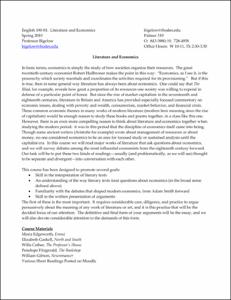Please use this identifier to cite or link to this item:
http://hdl.handle.net/10267/15336Full metadata record
| DC Field | Value | Language |
|---|---|---|
| dc.contributor.author | Bigelow, Gordon | - |
| dc.date.accessioned | 2013-02-05T16:30:48Z | - |
| dc.date.available | 2013-02-05T16:30:48Z | - |
| dc.date.issued | 2011-01-12 | - |
| dc.identifier.uri | http://hdl.handle.net/10267/15336 | - |
| dc.description | This syllabus was submitted to the Office of Academic Affairs by the course instructor. Uploaded by Archives RSA Josephine Hill. | en_US |
| dc.description.abstract | In basic terms, economics is simply the study of how societies organize their resources. The great twentieth-century economist Robert Heilbroner makes the point in this way: “Economics, as I see it, is the process by which society marshals and coordinates the activities required for its provisioning.” But if this is true, then in some general way literature has always been about economics. One could say that The Illiad, for example, reveals how great a proportion of its resources one society was willing to expend in defense of a particular point of honor. But since the rise of market capitalism in the seventeenth and eighteenth centuries, literature in Britain and America has provided especially focused commentary on economic issues, dealing with poverty and wealth, consumerism, market behavior, and financial crisis. These common economic themes in many works of modern literature (modern here meaning since the rise of capitalism) would be enough reason to study these books and poems together, in a class like this one. However, there is an even more compelling reason to think about literature and economics together when studying the modern period: it was in this period that the discipline of economics itself came into being. Though some ancient writers (Aristotle for example) wrote about management of resources or about money, no one considered economics to be an area for focused study or sustained analysis until the capitalist era. In this course we will read major works of literature that ask questions about economics, and we will survey debates among the most influential economists from the eighteenth century forward. Our task will be to put these two kinds of readings—usually (and problematically, as we will see) thought to be separate and divergent—into conversation with each other. This course has been designed to promote several goals: Skill in the interpretation of literary texts An understanding of the way literary texts treat questions about economics (in the broad sense defined above) Familiarity with the debates that shaped modern economics, from Adam Smith forward Skill in the written presentation of arguments The first of these is the most important. It requires considerable care, diligence, and practice to argue persuasively about the meaning of any work of literature or art, and it is this practice that will be the decided focus of our attention. The definitive and final form of your arguments will be the essay, and we will also devote considerable attention to the demands of this form. | en_US |
| dc.language.iso | en_US | en_US |
| dc.publisher | Memphis, Tenn. : Rhodes College | en_US |
| dc.relation.ispartofseries | Syllabi CRN;21175 | - |
| dc.rights | Rhodes College owns the rights to the digital objects in this collection. Objects are made available for educational use only and may not be used for any non-educational or commercial purpose. Approved educational uses include private research and scholarship, teaching, and student projects. For additional information please contact archives@rhodes.edu. Fees may apply. | - |
| dc.subject | English, Department of | en_US |
| dc.subject | Syllabus | en_US |
| dc.subject | Text | en_US |
| dc.subject | Curriculum | en_US |
| dc.subject | 2011 Spring | en_US |
| dc.title | ENGL 190-01, Literature and Economics, Spring 2011 | en_US |
| dc.type | Syllabus | en_US |
| Appears in Collections: | Course Syllabi | |
Files in This Item:
| File | Description | Size | Format | |
|---|---|---|---|---|
| 2011_SPRING_ENGL_190_01_21175.pdf | 577.27 kB | Adobe PDF |  View/Open |
Items in DSpace are protected by copyright, with all rights reserved, unless otherwise indicated.